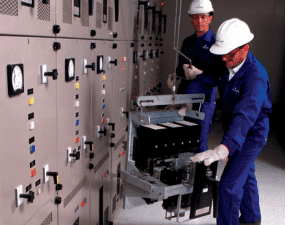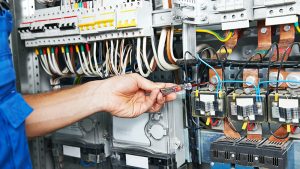Electrical Maintenance
are dedicated to providing a variety of
services to meet all your electrical needs.
can provide thermal imaging to prevent loss
of production and failure of critical components. We can complete new
construction with any style specifications and voltages in the range of
distribution. This includes reclosers, capacitors, platform racks and static
overhead protection for batteries and SWD’s.
will provide maintenance to the pole line
either energized or de-energized to suit the customer’s needs. A power quality
analysis can be run to reduce energy cost, as well as fuse coordination to
eliminate lease outages.
are equipped with a wide array of auger
widths to accommodate any hole digging needs. We strive for excellence in all
aspects of safety, quality and efficiency.
Electrical Maintenance
provides comprehensive full service
electrical maintenance for industrial plants, large commercial facilities and
municipal power stations. We are available 24 hours a day, seven days a week and
are maintenance manager’s first choice for electrical testing, maintenance and
repair
substation maintenance includes periodic
inspections, repairs, and if necessary equipment replacement. It is a systematic series of preventative
measures to ensure the safety of all personnel working around the equipment,
and the quality of the equipment itself.
The process normally includes visual and mechanical inspections that are
carried out by trained professionals who look for signs of damage, corrosion,
loose fittings, and displaced parts.
Unforeseen shutdowns due to equipment malfunctioning are costly,
however, with the right maintenance services, these shutdowns can be prevented.
Benefits of Maintenance
EPM (Electrical Preventative Maintenance)
and MPM (mechanical preventative maintenance) that ensures the containment of
problems before they occur. Potential
errors are diagnosed and addressed before they are able to become hazardous to
the health of the system and the personnel handling the system.
Benefits of EPM and MPM are listed below:
Extended equipment life cycle
Assurance that personnel are working under
a safe environment
Keeps equipment operating at manufacturer’s
standard to ensure reliability and safety
Maintenance prevents future wear and tear from
occurring as well as reduces cost for repairs
To keep substations operating at peak
conditions, major substation maintenance should be done annually
An Introduction to Substation Maintenance
If your organization runs with the support
of a sub-station, you will obviously require periodic maintenance. Timely
maintenance ensures that your sub-station operates efficiently, securely, and a
in a manner that makes it reliable. Think of it as just one of those things
that just needs to be done.
You see, after a point in time, a range of
problems can affect your sub-station, especially in terms of reliability and
performance If these issues are ignored, you can end up facing breakdowns and
even safety issues. To make things worse, you’ll have to foot the costs that
come with these issues.
ELECTRICAL MAINTENANCE AND FIBER OPTIC
Management information systems (MIS) in
industrial business consist of an information technology and networking system.
goal to develop advanced IT automation in order to find alternative and
reliable solutions at a minimum cost. BPI is able to develop a complete
networking system by effectively using
Fiber-optic technology
Advance database programming
Application software
OPC interfacing communication for advanced
IT automation
Electrical Maintenance Testing and
Engineering Services
testing and engineering service group,
working in conjunction with Vertiv Services, offers a complete line of
electrical maintenance testing and engineering services.
A comprehensive program of electrical
services helps identify the root cause of system availability problems, avoid
costly downtime, preempt emergency repairs, and maintain a safe operating
environment.
There are two primary benefits from
implementing effective preventive maintenance in a facility:
1) Reduced costs of repairs and minimized
or eliminated downtime.
2) Safety for personnel and property
damage.
Positives in Developing an Electrical
Testing Program
Good economic judgment is necessary for
developing an effective electrical preventive maintenance program. As indicated
earlier, two objectives of such a program should be focused on enhancing safety
and reducing equipment failure and loss. The program should include regular
inspections, periodic testing and servicing of equipment, and effective
record-keeping
There are four basic steps that should be
taken to develop an electrical preventive maintenance program. First, compile a
list of electrical equipment in the facility. Second, determine which equipment
is most critical for the operation. Third, implement a monitoring system for
length of use and duty cycles, and identify signs of failure or fatigue.
Fourth, identify the resources needed to implement the maintenance program.
Training and Safe Work Practices.
The technician performing periodic
maintenance and service of electrical equipment should have a thorough
understanding of the electrical field and should be trained and familiar with
the equipment and systems they must maintain and work on. Qualified and trained
personnel understand the construction and operation of equipment and
installations, and they have safety training to recognize and avoid the hazards
involved.
Summary
Preventive maintenance is often ignored and
considered too expensive to implement. In reality, it is a valuable investment
that is measurable. Preventive maintenance can help avoid equipment failure,
alleviate repair and replacement costs, and increase safety for personnel. It
should not be treated as an unnecessary investment.
Electrical Maintenance
A job as an Electrical Maintenance Man
falls under the broader career category of Electricians. The information on
this page will generally apply to all careers in this category but may not
specifically apply to this career title.
Job Description for Electricians : Install,
maintain, and repair electrical wiring, equipment, and fixtures. Ensure that
work is in accordance with relevant codes. May install or service street
lights, intercom systems, or electrical control systems.
What skills are required for Electricians?
Troubleshooting – Determining causes of
operating errors and deciding what to do about it.
Repairing – Repairing machines or systems
using the needed tools.
Judgment and Decision Making – Considering
the relative costs and benefits of potential actions to choose the most
appropriate one.
Active Listening – Giving full attention to
what other people are saying, taking time to understand the points being made,
asking questions as appropriate, and not interrupting at inappropriate times.
Critical Thinking – Using logic and
reasoning to identify the strengths and weaknesses of alternative solutions,
conclusions or approaches to problems.
Installation – Installing equipment,
machines, wiring, or programs to meet specifications.
Quality Control Analysis – Conducting tests
and inspections of products, services, or processes to evaluate quality or
performance.
Equipment Maintenance – Performing routine
maintenance on equipment and determining when and what kind of maintenance is
needed.
Active Learning – Understanding the
implications of new information for both current and future problem-solving and
decision-making.
Monitoring – Monitoring/Assessing
performance of yourself, other individuals, or organizations to make
improvements or take corrective action.
Speaking – Talking to others to convey
information effectively.
Instructing – Teaching others how to do
something.
Complex Problem Solving – Identifying
complex problems and reviewing related information to develop and evaluate
options and implement solutions.
Reading Comprehension – Understanding
written sentences and paragraphs in work related documents.
Equipment Selection – Determining the kind
of tools and equipment needed to do a job.
Coordination – Adjusting actions in
relation to others’ actions.
Mathematics – Using mathematics to solve
problems.
Learning Strategies – Selecting and using
training/instructional methods and procedures appropriate for the situation
when learning or teaching new things.
Operation Monitoring – Watching gauges,
dials, or other indicators to make sure a machine is working properly.
Operation and Control – Controlling
operations of equipment or systems.
Systems Analysis – Determining how a system
should work and how changes in conditions, operations, and the environment will
affect outcomes.
Systems Evaluation – Identifying measures
or indicators of system performance and the actions needed to improve or
correct performance, relative to the goals of the system.
Time Management – Managing one’s own time
and the time of others.
Management of Personnel Resources –
Motivating, developing, and directing people as they work, identifying the best
people for the job.
Writing – Communicating effectively in
writing as appropriate for the needs of the audience.
Service Orientation – Actively looking for
ways to help people.
Social Perceptiveness – Being aware of
others’ reactions and understanding why they react as they do.
Persuasion – Persuading others to change
their minds or behavior.
Operations Analysis – Analyzing needs and
product requirements to create a design.
What knowledge is needed to be an
Electrician?
Building and Construction – Knowledge of
materials, methods, and the tools involved in the construction or repair of
houses, buildings, or other structures such as highways and roads.
Mechanical – Knowledge of machines and
tools, including their designs, uses, repair, and maintenance.
Mathematics – Knowledge of arithmetic,
algebra, geometry, calculus, statistics, and their applications.
English Language – Knowledge of the
structure and content of the English language including the meaning and
spelling of words, rules of composition, and grammar.
Design – Knowledge of design techniques,
tools, and principles involved in production of precision technical plans, blueprints,
drawings, and models.
Public Safety and Security – Knowledge of
relevant equipment, policies, procedures, and strategies to promote effective
local, state, or national security operations for the protection of people,
data, property, and institutions.
Customer and Personal Service – Knowledge
of principles and processes for providing customer and personal services. This
includes customer needs assessment, meeting quality standards for services, and
evaluation of customer satisfaction.
Administration and Management – Knowledge
of business and management principles involved in strategic planning, resource
allocation, human resources modeling, leadership technique, production methods,
and coordination of people and resources.
Physics – Knowledge and prediction of
physical principles, laws, their interrelationships, and applications to
understanding fluid, material, and atmospheric dynamics, and mechanical,
electrical, atomic and sub- atomic structures and processes.
Telecommunications – Knowledge of transmission,
broadcasting, switching, control, and operation of telecommunications systems.
Education and Training – Knowledge of
principles and methods for curriculum and training design, teaching and
instruction for individuals and groups, and the measurement of training
effects.
Engineering and Technology – Knowledge of
the practical application of engineering science and technology. This includes
applying principles, techniques, procedures, and equipment to the design and
production of various goods and services.
Computers and Electronics – Knowledge of
circuit boards, processors, chips, electronic equipment, and computer hardware
and software, including applications and programming.
Clerical – Knowledge of administrative and
clerical procedures and systems such as word processing, managing files and
records, stenography and transcription, designing forms, and other office
procedures and terminology.
























